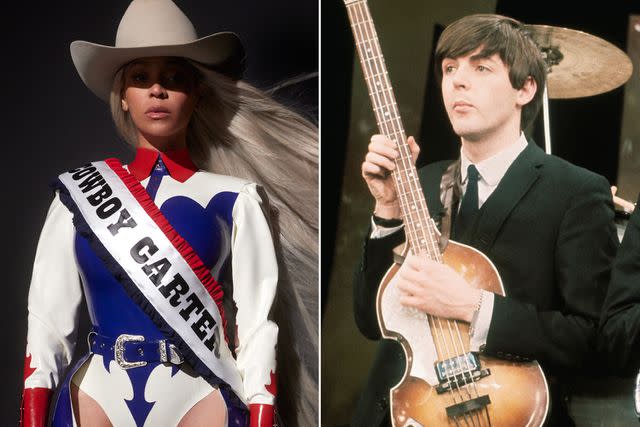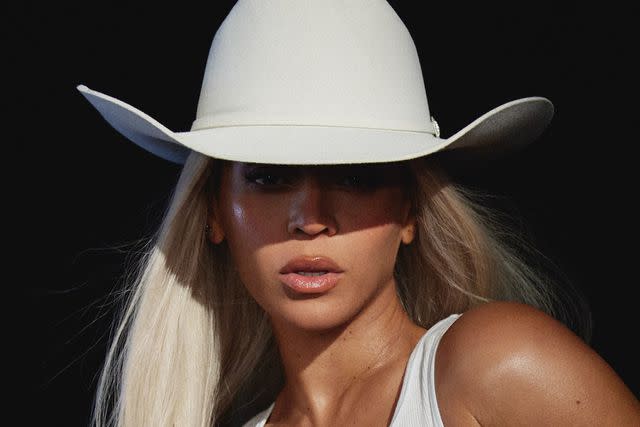The Meaning Behind Beyoncé's Epic Cover of The Beatles' Classic 'Blackbird' on “Cowboy Carter”
- Oops!Something went wrong.Please try again later.
- Oops!Something went wrong.Please try again later.
- Oops!Something went wrong.Please try again later.
Beyoncé released her new album 'Cowboy Carter' on Friday
Beyoncé's new album Cowboy Carter is finally out in the world, and it features several surprises — one of which is a cover of The Beatles' 1968 classic "Blackbird."
While the superstar doesn't usually opt for covers, there are two that appear on her 27-track project which was released on Friday, including her take on Dolly Parton's 1974 hit "Jolene."
However, "Blackbiird," which appears to be a nod to Act II, holds a special significance to Beyoncé, 42, as she teams up with a quartet of Black country singers: Brittney Spencer, Reyna Roberts, Tanner Adell and Tiera Kennedy.
As the singer said herself, Cowboy Carter "ain't a country album, this is a Beyoncé album," so it's not too shocking that the 32-time Grammy winner experiments with genre throughout the project, including putting her own spin on this folk-rock ballad.

BLAIR CALDWELL; Paul Popper/Popperfoto via Getty
Beyoncé; Paul McCartney"Blackbird" was originally written by Paul McCartney and John Lennon in 1968. Throughout the years, The Beatles' frontman, 81, has been vocal about the meaning behind the track, which is teeming unwavering hope despite adversity ("take these broken wings and learn to fly").
McCartney has often discussed how the American civil rights movement and specifically the Little Rock Nine, the nine Black teenagers who, in 1957, faced discrimination after they enrolled in a formerly all-white high school after the ruling of Brown vs. Board of Education.
“I was sitting around with my acoustic guitar and I’d heard about the civil rights troubles that were happening in the ’60s in Alabama, Mississippi, Little Rock in particular,” he told GQ in 2018. “I just thought it would be really good if I could write something that if it ever reached any of the people going through those problems, it might give them a little bit of hope. So, I wrote ‘Blackbird.'”
He also clarified that "in England, 'bird' is a 'girl'" so "Blackbird" he used as a metaphor for "Black girl."
During a 2016 performance in North Little Rock, Arkansas — per a fan-posted video — McCartney introduced the number by telling the crowd, “Way back in the Sixties, there was a lot of trouble going on over civil rights, particularly in Little Rock. We would notice this on the news back in England, so it’s a really important place for us, because to me, this is where civil rights started. We would see what was going on and sympathize with the people going through those troubles, and it made me want to write a song that, if it ever got back to the people going through those troubles, it might just help them a little bit, and that’s this next one.”
He also had the opportunity to meet two members of the Little Rock Nine, Thelma Mothershed Wair and Elizabeth Eckford, following the performance.
Never miss a story — sign up for PEOPLE's free daily newsletter to stay up-to-date on the best of what PEOPLE has to offer, from celebrity news to compelling human interest stories.

Blair Caldwell
BeyoncéRelated: Beyoncé's Cowboy Carter Is Here! Every Artist Featured on the New Album
“Incredible to meet two of the Little Rock Nine— pioneers of the civil rights movement and inspiration for Blackbird,” the "Hey Jude" artist tweeted at the time.
"Blackbird" has been covered by a cohort of famous musicians over the years including Dave Grohl, Sarah McLachlan and Crosby, Stills & Nash. However, Beyoncé's inclusion of Spencer, Roberts, Adell and Kennedy reaffirms the original meaning of the song and re-centers it around Black women.
The team-up of the "Cozy" performer and her collaborators also gives power to Black women in the country genre, which not only has a racist history but continues to be exclusionary to non-white and female artists.
For more People news, make sure to sign up for our newsletter!
Read the original article on People.

